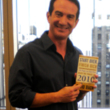The one-page financial plan: a simple way to be smart about your money
Description
It’s no surprise that even my most successful friends feel confused or paralyzed. Even if they have a shelfful of personal finance books, they don’t have time to make sense of all the information available. They don’t just want good advice, they want the best advice—so rather than do the “wrong thing,” they do nothing. Their 401(k) and bank statements pile up, unexamined or maybe even unopened.
What they don’t realize is that bad calls about money aren’t failures; they’re just what happens when emotional creatures have to make decisions about the future with limited information. What I tell them is that we need to scrap striving for perfection and instead commit to a process of guessing and making adjustments when things go off track. Of course we’re going to make the best guesses we can—but we’re not going to obsess over getting them exactly right.
The fact is, in a single page you can prioritize what you really want in life and figure out how to get there. That’s because a great financial plan has nothing to do with what the markets are doing, what your real estate agent is pitching, or the hot stock your brother-in-law told you about. It has everything to do with what’s most important to you.By now you may be wondering, “What about the details? How much do I need to invest each year, and how do I allocate it? How much life insurance do I need?” Don’t worry: I’ll cover those topics and many more, sharing strategies that will take the complexity out of them.The most important thing is getting clarity about the big picture so you can cope with the unexpected. Maybe you’ll lose the job you thought was secure; you’ll take a financial risk that doesn’t pan out; you’ll have twins when you were only budgeting for one. In other words: Life will happen.
But no matter what happens, this book will help you bridge the gap between where you are now and where you want to go.
More Details
9781469061047
9780698184565
Table of Contents
From the Book
Excerpt
Similar Titles From NoveList
Published Reviews
Booklist Review
Face-to-face conversations, it seems, are the root of all things good, an approach somewhat forgotten in this age of social media. It's exactly what Richards, CFP and author of The Behavior Gap (2012), advocates for figuring out finances and plans. Gone are the involved multipage spreadsheets detailing what money steps to take next. In their place is a series of structured dialogues that start with the question, Why is money so important to you? Then answers become clear and easily captured on a napkin believe it or not. The process focuses on what you can control, how to eliminate baggage, and ways to set forth a clarity about your current goals for money. He emphasizes simplicity, using perhaps a lot of the advice our parents used, from keeping costs low to remembering that there is a correlation between risk and reward. He shares endearing techniques to control overspending, such as the spending cleanse (not spending any money for a short period of time). Sensible, sensitive, and smart and, yes, worth every penny.--Jacobs, Barbara Copyright 2015 Booklist
Library Journal Review
Taking ownership of one's monetary situation and becoming financially literate is, without a doubt, a crucial life skill, and one that has been addressed in all manner of publications. As the title suggests, this book aims to simplify the process of creating a financial plan. Its four parts ("Discovery," "Spending and Saving," "Investing," and "Strategies for Avoiding the Big Mistake") follow the steps for laying the groundwork, creating the plan, sticking to it, and adjusting the strategy periodically. New York Times "Sketch Guy" columnist Richards (The Behavior Gap) advises boiling down the financial agenda to its most basic elements: Why is money important in your life or what goals will you be using your money for, and what are the concrete steps that will help you get there? The "Discovery" section of the book provides advice on articulating goals and defining the importance of money while the other three chapters help readers think about steps that can help them achieve their aspirations. VERDICT This ultrasimple planning process will be welcomed by the financially stressed and will appeal to fans of Dave Ramsey (Dave Ramsey's Complete Guide to Money; The Total Money Makeover).-Sara Holder, McGill Univ. Libs., Montreal © Copyright 2015. Library Journals LLC, a wholly owned subsidiary of Media Source, Inc. No redistribution permitted.
Booklist Reviews
Face-to-face conversations, it seems, are the root of all things good, an approach somewhat forgotten in this age of social media. It's exactly what Richards, CFP and author of The Behavior Gap (2012), advocates for figuring out finances and plans. Gone are the involved multipage spreadsheets detailing what money steps to take next. In their place is a series of structured dialogues that start with the question, "Why is money so important to you?" Then answers become clear and easily captured on a napkin—believe it or not. The process focuses on what you can control, how to eliminate baggage, and ways to set forth a clarity about your current goals for money. He emphasizes simplicity, using perhaps a lot of the advice our parents used, from keeping costs low to remembering that there is a correlation between risk and reward. He shares endearing techniques to control overspending, such as the "spending cleanse" (not spending any money for a short period of time). Sensible, sensitive, and smart—and, yes, worth every penny. Copyright 2014 Booklist Reviews.
Library Journal Reviews
Taking ownership of one's monetary situation and becoming financially literate is, without a doubt, a crucial life skill, and one that has been addressed in all manner of publications. As the title suggests, this book aims to simplify the process of creating a financial plan. Its four parts ("Discovery," "Spending and Saving," "Investing," and "Strategies for Avoiding the Big Mistake") follow the steps for laying the groundwork, creating the plan, sticking to it, and adjusting the strategy periodically. New York Times "Sketch Guy" columnist Richards (The Behavior Gap) advises boiling down the financial agenda to its most basic elements: Why is money important in your life or what goals will you be using your money for, and what are the concrete steps that will help you get there? The "Discovery" section of the book provides advice on articulating goals and defining the importance of money while the other three chapters help readers think about steps that can help them achieve their aspirations. VERDICT This ultrasimple planning process will be welcomed by the financially stressed and will appeal to fans of Dave Ramsey (Dave Ramsey's Complete Guide to Money; The Total Money Makeover).—Sara Holder, McGill Univ. Libs., Montreal
[Page 98]. (c) Copyright 2014. Library Journals LLC, a wholly owned subsidiary of Media Source, Inc. No redistribution permitted.































